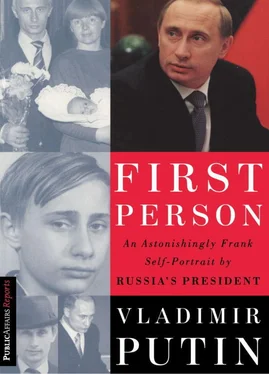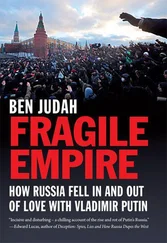Vladimir Putin - First Person
Здесь есть возможность читать онлайн «Vladimir Putin - First Person» весь текст электронной книги совершенно бесплатно (целиком полную версию без сокращений). В некоторых случаях можно слушать аудио, скачать через торрент в формате fb2 и присутствует краткое содержание. Город: New York, Год выпуска: 2000, ISBN: 2000, Издательство: PublicAffairs, Жанр: Биографии и Мемуары, Политика, Политика, Публицистика, на английском языке. Описание произведения, (предисловие) а так же отзывы посетителей доступны на портале библиотеки ЛибКат.
- Название:First Person
- Автор:
- Издательство:PublicAffairs
- Жанр:
- Год:2000
- Город:New York
- ISBN:978-0-786-72327-0
- Рейтинг книги:3 / 5. Голосов: 1
-
Избранное:Добавить в избранное
- Отзывы:
-
Ваша оценка:
- 60
- 1
- 2
- 3
- 4
- 5
First Person: краткое содержание, описание и аннотация
Предлагаем к чтению аннотацию, описание, краткое содержание или предисловие (зависит от того, что написал сам автор книги «First Person»). Если вы не нашли необходимую информацию о книге — напишите в комментариях, мы постараемся отыскать её.
First Person — читать онлайн бесплатно полную книгу (весь текст) целиком
Ниже представлен текст книги, разбитый по страницам. Система сохранения места последней прочитанной страницы, позволяет с удобством читать онлайн бесплатно книгу «First Person», без необходимости каждый раз заново искать на чём Вы остановились. Поставьте закладку, и сможете в любой момент перейти на страницу, на которой закончили чтение.
Интервал:
Закладка:
But he didn’t like socializing much. He preferred sports. He started doing martial arts in order to learn how to defend himself. Four times a week he took classes somewhere near the Finland Station, and he got pretty good. He loved his sambo. And then he started taking part in competitions, which often required him to travel to other cities.
I got into sports when I was about 10 or 11. As soon as it became clear that my pugnacious nature was not going to keep me king of the courtyard or schoolgrounds, I decided to go into boxing. But I didn’t last long there. I quickly got my nose broken. The pain was terrible. I couldn’t even touch the tip of my nose. But even though everyone was telling me I needed an operation, I didn’t go to the doctor. Why? I knew it would heal by itself. And it did. But I lost my boxing bug after that.
Then I decided to go in for sambo, a Soviet combination of judo and wrestling. Martial arts were popular at the time. I went to a class near my house and began to work out. It was a very plain gym that belonged to the Trud athletic club. I had a very good trainer there, Anatoly Semyonovich Rakhlin. He devoted his whole life to his art, and is still training girls and boys to this day.
Anatoly Semyonovich played a decisive role in my life. If I hadn’t gotten involved in sports, I’m not sure how my life would have turned out. It was sports that dragged me off the streets. To be honest, the courtyard wasn’t a very good environment for a kid.
At first I studied sambo. Then judo. Coach decided that we would all switch to judo, and we did.
Judo is not just a sport, you know. It’s a philosophy. It’s respect for your elders and for your opponent. It’s not for weaklings. Everything in judo has an instructive aspect. You come out onto the mat, you bow to one another, you follow ritual. It could be done differently, you know. Instead of bowing to your opponent, you could jab him in the forehead.
Did you ever smoke?
No. I tried it a couple of times, but I never smoked regularly. And when I began to do sports, I simply ruled it out. I used to work out every other day, and then every day. Soon I had no time left for anything else. I had other priorities; I had to prove myself in sports, achieve something. I set goals. Sports really had a strong influence on me.
And you didn’t try karate? That was popular in those days, even thought it was banned.
We thought karate and all other noncontact sports were like ballet. Sports was only sports if you had to shed sweat and blood and work hard.
Even when karate became popular and karate schools of all sorts began springing up, we viewed them purely as moneymaking enterprises. We, on the other hand, never paid any money for our lessons. We all came from poor families. And since karate lessons cost money from the start, the kids taking karate thought they were first class.
Once we went to the gym with Leonid Ionovich, the senior coach from Trud. The karate students were working out on the mat, although it was our turn. Leonid went up to their trainer and told him it was time for our class. The karate trainer didn’t even look his way—as if to say, get lost. Then Leonid, without saying a word, flipped him, squeezed him lightly, and dragged him off the mat. He had lost consciousness. Then Leonid turned to us and said, “Go on in and take your places.” That was our attitude toward karate.
Did your parents encourage you to take these lessons?
No, just the opposite. At first, they were very suspicious. They thought I was acquiring some sort of ugly skill to use on the street. Later, when they met the trainer and he began to visit our home, their attitude changed. And when I achieved my first successes, my parents understood that judo was a serious and useful art.
You started winning?
Yes, within about a year or two.
Vera Dmitrievna Gurevich:
I taught Volodya from fifth through eighth grade. And then we had to decide what school to send him to. Most of the class went to School No. 197 on Petra Lavrova Street. But Volodya and Slava Yakovlev chose a school with a special focus on chemistry. I think Slava talked him into it.
I was surprised at the time. But Volodya told me, “We’ll study there a while, and then we’ll see.” He was never hasty. He also got good grades in that school. He had a wonderful teacher named Minna Moiseyevna Yuditskaya. She also taught German. And oddly, I visited the Putins’ home even more often than I had before, as I was helping Volodya with his German. I wanted him to speak German well. He would help me too. Besides teaching elementary school, I taught in the evenings at a technical school for architects and builders. Once, my husband had to go away on a business trip. My daughters were still little at the time. So I said, “Volodya, help me out. I’m coming home late and my girls might be afraid if they wake up.” He would come and look in on them and even stay the night.
I think Volodya is a good person. But he never forgives people who betray him or are mean to him. In any case, that’s what I think.
Volodya wasn’t very popular in his new school, as far as I could tell. But he did have a literature class with a teacher named Kochergin who made the lessons really creative and interesting. I remember one of the topics quite well that he assigned for student compositions. It was unusual for those times: “A revolution has a beginning, a revolution has no end.” Well, you could write a whole treatise on that one!
Right after graduating from school, Volodya announced that he was going to law school. I don’t know what influenced his choice. Why law school? We had thought originally that he would go to a technical institute. Lena Gryaznova went to the technical institute, and they were close. There was much that linked Volodya and Lena. She had starting coming over to the Putin house as early as sixth grade. Volodya was not especially interested in girls; but they were certainly interested in him.
So all of a sudden, he announced to everyone: “I’m going to university.” And I said “How?” And he said “I”ll solve that problem myself.”
Even before I graduated from school, I wanted to work in intelligence. It was a dream of mine, although it seemed about as likely as a flight to Mars. And sure, my ambitions sometimes changed. I also wanted to be a sailor. And at one point I really wanted to be a pilot.
The Academy of Civil Aviation is in Leningrad, and I was hell-bent on getting in. I read the literature and even subscribed to an aviation journal. But then books and spy movies like The Sword and the Shield took hold of my imagination. What amazed me most of all was how one man’s effort could achive what whole armies could not. One spy could decide the fate of thousands of people. At least, that’s the way I understood it.
The Academy of Civil Aviation quickly lost its thrill. I had made my choice. I wanted to be a spy.
My parents didn’t understand this right away. My coach had gone to see them and told them that as an athlete, I could get into an institute practically without passing exams. So they tried to talk me into going to an institute. My coach took their side. He couldn’t understand why I was resisting. “He has a 100 percent chance of getting into that Academy of Civil Aviation,” he told my parents. “And if he doesn’t get into university, then he’ll have to go into the army.”
It was a difficult situation. My father had a very commanding personality. But I dug my heels in and said I had made up my mind.
Then another coach of mine from the Trud Club, Leonid Ionovich, came to visit. He was a clever guy. “Well,” he said to me. “Where are you going?” Of course he already knew. He was just acting sly. I said, “To university.” “Oh, that’s great, good for you,” he said, “in what department?” “The law school,” I answered. Then he roared: “What?! To catch people? What are you doing? You’ll be a cop. Do you understand?!” I was insulted. “I’m not going to be a cop!” I yelled back.
Читать дальшеИнтервал:
Закладка:
Похожие книги на «First Person»
Представляем Вашему вниманию похожие книги на «First Person» списком для выбора. Мы отобрали схожую по названию и смыслу литературу в надежде предоставить читателям больше вариантов отыскать новые, интересные, ещё непрочитанные произведения.
Обсуждение, отзывы о книге «First Person» и просто собственные мнения читателей. Оставьте ваши комментарии, напишите, что Вы думаете о произведении, его смысле или главных героях. Укажите что конкретно понравилось, а что нет, и почему Вы так считаете.












